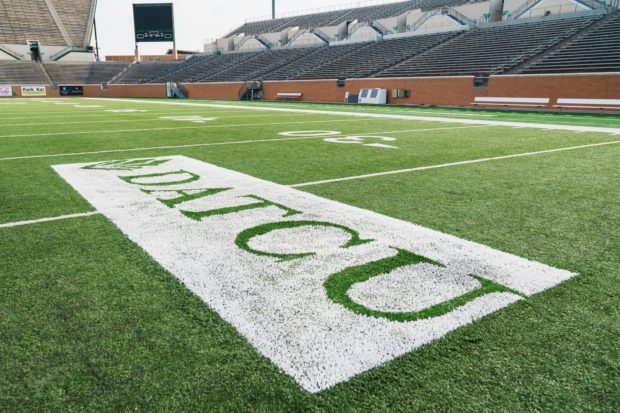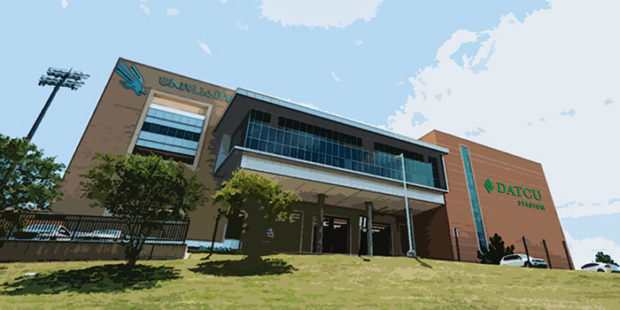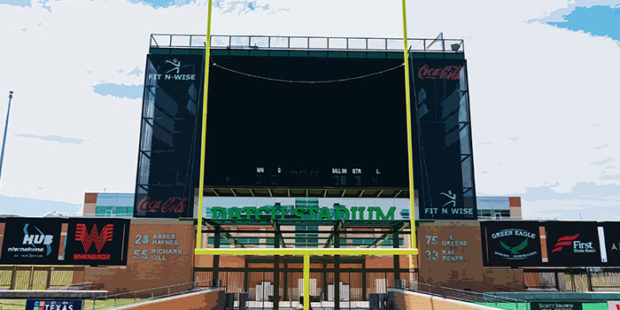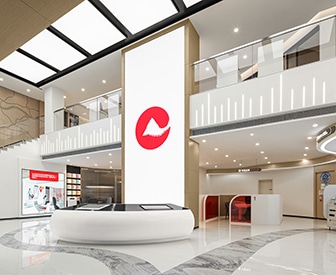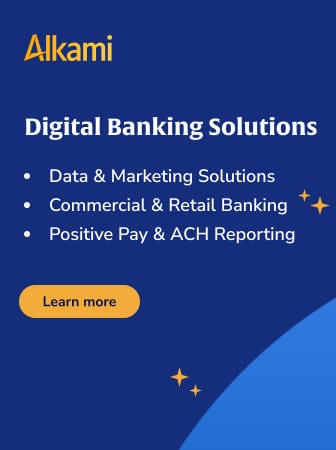In early January, Melanie Vest was scrolling through the local news on her phone when she came across an item she just had to share right away. The company with the naming rights to the football stadium at the University of North Texas had decided to let its agreement with the school lapse.
Vest, the president of the Denton, Texas-based credit union DATCU, immediately took a screenshot of the story and texted it to Glen McKenzie, DATCU’s chief executive officer.
“What? You want to do a partnership with UNT?” McKenzie wrote back.
“Well, DATCU Stadium sure has a nice ring to it,” Vest replied.
Nine months later, at UNT’s home opener against the University of California, the Mean Green made their entrance beneath a scoreboard bearing the DATCU logo and charged onto a field in a stadium renamed for the credit union.
Besides sharing a hometown, the two institutions also have some shared history going back nearly 90 years. A dozen local educators — half of them professors at the school that became UNT — founded the Denton Area Teachers Credit Union in 1936.
Today, DATCU has more than 100,000 members and assets of more than $1.5 billion.
DATCU joins the ranks of dozens of banks and credit unions around the country that have their names on sports venues. These run the gamut from stadiums for major professional sports to those at smaller colleges.
(We’ve compiled a list of the financial institutions with naming rights to college sports facilities. Scroll down for a chart featuring the credit unions and another chart featuring the banks.)

Banking Transformed Podcast with Jim Marous
Listen to the brightest minds in the banking and business world and get ready to embrace change, take risks and disrupt yourself and your organization.

Join industry’s leading AI conference - free passes available!
Ai4 is coming to Las Vegas, August 12-14 2024. Join thousands of executives and technology innovators at the epicenter of the AI community.
Read More about Join industry’s leading AI conference - free passes available!
Getting Buy-In for a Stadium Naming-Rights Deal
Banks and credit unions generally pursue naming-rights agreements as a way to associate themselves with something important to the communities they serve, says E.J. Narcise, founder and principal of Team Services LLC in Rockville, Md., which advises both potential sponsors and venue owners on naming-rights negotiations.
Narcise has worked on the naming rights for M&T Bank Stadium in Baltimore, home of the Baltimore Ravens; EverBank Stadium in Jacksonville, Fla., home of the Jacksonville Jaguars, and Bank of America Stadium in Charlotte, N.C., home of the Carolina Panthers.
“DATCU Stadium sure has a nice ring to it.”
— Melanie Vest, DATCU
Though not involved in the DATCU Stadium deal, Narcise says he has advised other credit unions on naming rights. He has found that it’s important for institutions like community banks and credit unions to get buy-in across the business, as this tends to be one of the biggest advertising expenditures they will ever incur.
“They need to be able to spread this out internally, across a number of budgets,” he says.
This exercise is particularly valuable because it forces management to assess the ways that the institution expects to benefit from the arrangement at a more granular level, Narcise says.
The opportunities to build brand awareness, showcase products, enhance business development, and expand community outreach can benefit many departments, he adds.
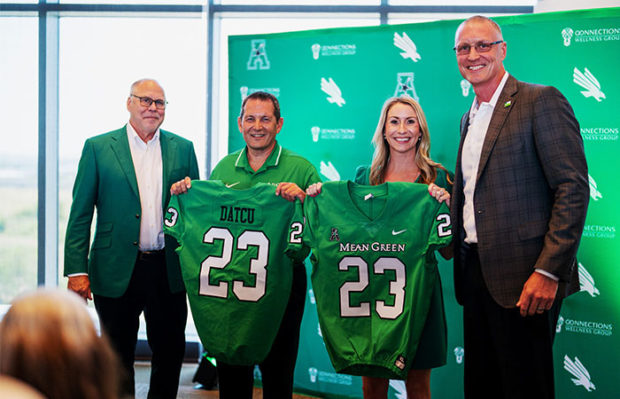
From left, Neal Smatresk, UNT president; Glen McKenzie, DATCU CEO; Melanie Vest, DATCU president; Jared Mosley, UNT vice president and director of athletics.
One change he’s seen in recent years is that naming-rights agreements have become much more flexible. Years ago, the typical contract was for 20 years, with little or no opportunity to renegotiate the terms, he says. Lately, though, he has negotiated 10-year and even five-year contracts with options for extension.
The Benefits for DATCU Go Beyond Naming Rights
DATCU negotiated a 15-year naming-rights deal with the University of North Texas, which competes in the American Athletic Conference. With 45,000 students, it is one of the 25 largest colleges in the country.
The contract — totaling $21.5 million — calls for a one-time payment of $500,000 and annual fees starting at $1.2 million for the first two years and rising gradually to $1.5 million in the final two years.
It makes DATCU the exclusive financial services partner of the UNT athletics program, allowing the credit union’s logo to appear at all of the school’s athletic venues. DATCU is also a non-exclusive financial services partner with the university and its alumni association, which has about 400,000 members, the majority of whom reside in the greater Dallas-Fort Worth area, where Denton is located.
In addition, DATCU will be able to open an on-campus branch in the student union, pursue affinity marketing arrangements with both students and alumni, and continue its sponsorship of the UNT Career Center. The credit union works with the career center on programs to develop soft skills and gains a steady stream of interns seeking business experience before graduation.
The on-campus location will bring DATCU’s total number of branches to 13. They are scattered across the 11 counties in North Texas where individuals must live or work to qualify as members of the credit union.
Independent Sports & Entertainment advised on the naming-rights deal.
Assessing the price tag, McKenzie says that DATCU executives are satisfied that the outlay will be well worth the exposure. “We think the value is there, and we think it will be a value to both of us — to UNT and to DATCU.”
Read more:
- Get Ready for 2026 World Cup Now, To Enjoy a Big Marketing Payoff
- Social Media Booster for Marketers: Sponsoring College Athletes

From UNT to UC Davis, Credit Unions Are College Sports Fans Too
In striking its deal with the University of North Texas, DATCU joins the ranks of credit unions across the country that have paid to put their names on a variety of collegiate sports venues.
Some host large Division I athletic programs, like the 54,000-seat SECU Stadium at the University of Maryland in College Park, named for the State Employees Credit Union of Maryland, or the 40,000-seat TDECU Stadium at the University of Houston, named for the Texas Dow Employees Credit Union.
Others are more modest. For example, University Credit Union in Los Angeles has its name on two multi-purpose indoor arenas. One is the 3,500-seat University Credit Union Pavilion at St. Mary’s College in Morgana, Calif., and the other is the 7,600-seat University Credit Union Center at University of California, Davis. Basketball and volleyball teams share both facilities.
Credit Unions with Naming Rights to Collegiate Sports Venues
Narcise says that, for any financial institution considering entering into a naming-rights deal, it’s important to understand the type of organization they will be partnering with — be it a sports franchise, a university, or other venue owner — and to be certain that there is a good cultural fit.
“Right from the start, you have to be able to take a look at the entity that you’re considering partnering with, and understand the culture of that particular brand,” he says. “You need to understand where the points of intersection are with that brand, and how it’s positioned in that particular market, and where that will overlap or intersect with your core objectives.”
For credit unions in particular, where there is sensitivity to large marketing expenses, this analysis helps with assessing how a naming-rights deal can advance goals such as bettering the community or connecting with underserved consumers, Narcise says.
See all of our latest coverage of bank marketing strategies.

The unfair advantage for financial brands.
Offering aggressive financial marketing strategies custom-built for leaders looking to redefine industry norms and establish market dominance.

The Power of Localized Marketing in Financial Services
Learn how to enhance your brand’s local visibility, generate more leads, and attract more customers, all while adhering to industry regulations and compliance.
Read More about The Power of Localized Marketing in Financial Services
The Pitfalls to Avoid with Stadium Naming-Rights Deals
When a financial institution is considering a naming-rights deal, there are potential pitfalls to avoid.
First among them is getting stuck with a deal that is less exclusive than it appears, Narcise says. He has seen deals in which the venue tried to build a “firewall” between credit union sponsorships and bank sponsorships. The objective was to have space to designate both an official credit union partner and an official bank partner. So if the intent is to be the exclusive financial services partner of a venue, that language needs to be explicit in the agreement.
Another concern, and one less easily avoided, is tying the financial institution’s brand to that of a particular team or educational institution for the long term, with little control over how that second entity curates its own public image.
Particularly with sports teams, a driving force behind the purchase of naming rights is the ability to associate the credit union with the passion of the team’s fan base, Narcise says. But that passion has a flip side.
“If they are not successful, or if there, unfortunately, is some sort of a scandal with a player or the owner, you are going to live and die with that brand,” Narcise says. “And so you need to have very thick skin, and you need to go into this with your eyes wide open.”
Banks with Naming Rights to Collegiate Sports Venues

DATCU Has Big Plans for UNT’s Football Season and Beyond
In Denton, with the Mean Green’s football season just getting underway and the paint barely dry on DATCU’s new signage, the credit union’s executives are still planning out how they intend to capitalize on the new arrangement.
When it comes to home football games, DATCU’s presence will extend far beyond the signs on the stadium. The credit union will have a dedicated tailgate celebration area, including a 40-foot shipping container converted into a meeting space. The venue will be designed to draw crowds before each home game — particularly UNT undergraduates.
Other plans include in-game promotions and special game-day events, such as the DATCU-sponsored naming of a faculty member of the year, recognition of local first responders, and more.
Down the road, the credit union is exploring advertising opportunities that zero in on UNT fans, including the use of geofencing technology to target mobile ads to the social media feeds of those present at the stadium.
DATCU plans to deepen its involvement with the University of North Texas off the field as well. Vest, DATCU’s president, says that one of the ways she expects the credit union to benefit is through an expansion of its involvement with the school’s career center. In addition to helping to communicate the kinds of skills that an employer like DATCU values, she anticipates the credit union will be actively involved in offering training programs for UNT students.
She sees a steady stream of interns from the school getting hands-on experience working with the credit union — including in the on-campus branch. “We want to be able to have finance and accounting majors running the branch, or interior design students helping create the branch of the future,” she says. “Those students are the experts of the future.”
It’s a pitch Vest is uniquely positioned to make. A graduate of UNT herself, she started her career as a part-time drive-thru teller at DATCU.
If the recent experience of McKenzie, DATCU’s CEO, is any guide, the credit union probably won’t have trouble filling those slots. He says some of the current tellers are UNT students and several made a special request when he saw them at work.
“Yesterday, I just happened to go out to three branches, and I had three different people asking me if they could work at the UNT branch, because they go to school out there. They said it would be nice if they could just take a class and then go to work. So it’s a good thing for everybody,” McKenzie says.

